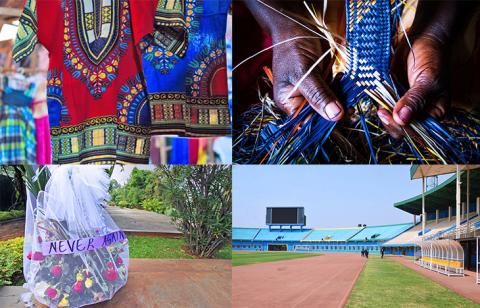Places to Visit in Kigali
No matter how much time you have to spend in Kigali, you should plan to devote at least a couple of hours to the Kigali Genocide Memorial. The haunting museum explains the events that fueled the 1994 Rwandan genocide, and gives some essential context for the subsequent decades of peace and development in the country.
Then, explore Kigali's charming neighborhoods and attractions. Sip bold, sustainable java at Question Coffee Cafe. Shop for locally made souvenirs at the Nyamirambo Women's Center. Lose yourself in contemporary artwork at the Rwanda Art Museum.
As you plan your trip to Rwanda, don't miss out on everything the country's largest city has to offer. Plan your sightseeing with our list of the top things to do in Kigali.
Note: Some businesses may be temporarily closed due to recent global health and safety issues.
1. Kigali Genocide Memorial
Kigali Genocide Memorial
You can't begin to appreciate everything Rwanda has become until you understand the reasons behind the devastating Rwandan genocide—a conflict that killed some 800,000 people, most of whom were members of the Tutsi ethnic minority, in just 100 days. The Kigali Genocide Memorial sheds light on the historical events that led to the genocide and horrifying realities Rwandans faced in 1994.
Prepare yourself: A visit to the memorial (where 250,000 victims are interred) is emotionally demanding but gives tourists a foundation with which to comprehend this complex country. You'll start by watching a short documentary film about the Rwandan genocide before making your way through three permanent exhibitions, filled with artifacts, timelines, historical information, and photographs.
The main exhibit focuses on the 1994 genocide against the Tutsi and moderate Hutus. It explains how colonization affected Rwandan society and created divisions that previously didn't exist between Hutus and Tutsis. Then, through displays of powerful photographs, artifacts, and audio-visual displays on dark, circular halls, the exhibit unveils the events that sparked the genocide, what happened during those 100 brutal days, heart-wrenching stories of survival, and feats of rescue from locals and outsiders alike. Sculptures and stained-glass windows pepper the moving space, making it feel sacred.
You'll eventually make your way through the Children's Room, which displays a gallery of life-size portraits of the youngest victims of the genocide, some of whom were infants. It keeps the memory of the children alive through details about their favorite toys, sports, foods, songs, and more. The museum concludes with an exhibit on other genocides and massacres around the world, putting the Rwandan genocide into context and examining potential strategies for prevention and intervention.
After your visit, head outside to pay your respects to the victims in the Gardens of Reflection. The park-like setting offers the right atmosphere for quiet contemplation on everything you just saw.
2. Nyamirambo Women's Center
Basket weaving in Rwanda
If you want to shop for truly heartwarming souvenirs, swing by the Nyamirambo Women's Center. The women-founded organization was launched in late 2007 in an effort to address gender inequality and empower women.
In addition to offering free education and vocational training, it employs women at fair wages to fill its intimate boutique with ethically-made goods. Tourists can pick up beautifully printed tote bags, hand-woven baskets in every shape and size, patterned place mats, crocheted rugs, beaded jewelry, and local-inspired fashions.
If some of the best shopping in the area isn't enough of a draw, here's another reason why visiting the Nyamiramo Women's Center is one of the best things to do in Kigali: its community immersions. The group offers fascinating walks through Nyamirambo with guides who were either born in the neighborhood or live here now, taking travelers through local hair salons, mosques, tailors, and agricultural businesses.
The center also invites tourists to participate in traditional cooking classes and basket-weaving workshops. The experiences will give you an insider's view of Rwandan culture.
Address: KN 7 Ave., Kigali
Official site: http://www.nwc-umutima.org/
3. Amahoro Stadium
Rwandan soccer player
Amahoro Stadium is the best place to see sports and entertainment in Rwanda. Sitting in the stands with up to 30,000 excited spectators watching Rayon Sports Football Club and Armée Patriotique Rwandaise Football Club take on opponents is an unforgettable experience, thrusting tourists into the heart of Rwanda's fervor for soccer.
The stadium also hosts rugby matches, live performances, marathons, and other events. Check the events listings in the local newspapers, or ask your hotel concierge about what's coming up during your stay.
Amahoro, which means "peace," is more than a sports center, though—it's a historical site. Around 12,000 people sought refuge at the stadium for weeks during the Rwandan genocide, trying to survive with little more than the clothes on their back under the open sky. The stadium pays homage to this important piece of history with events of remembrance around the anniversary of the genocide.


Comments
Leave a Comment